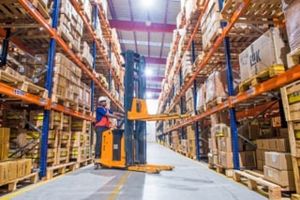Bonded Warehouse (Customs Glossary)
| This article is part of the Customs Glossary Guide |

In the context of North American trade, a Bonded Warehouse is a specialized facility authorized by customs authorities to store imported goods, foreign merchandise, and domestically produced goods under bond without paying import duties or taxes until they are released for consumption or exported. Bonded warehouses play a crucial role in facilitating international trade, offering businesses various benefits, including deferring customs duties and taxes, streamlining logistics, and enhancing supply chain efficiency. This article defines what a Bonded Warehouse is in North American trade and explores the scenarios in which these facilities are used.
What is a Bonded Warehouse?
A Bonded Warehouse is a secure storage facility that operates under the supervision of customs authorities in North American countries. It allows businesses to store imported goods and merchandise without immediate payment of customs duties, taxes, or other import-related fees. This suspension of duties and taxes provides a cost-effective solution for businesses engaged in international trade, enabling them to defer payments until the goods are either released for consumption within the country or exported to foreign markets.
Scenarios in Which Bonded Warehouses are Used:
Importation for Re-Exportation:
Scenario: A company imports raw materials into the United States, intending to process and manufacture finished products for export to other countries. Usage of Bonded Warehouse: The company stores the imported raw materials in a Bonded Warehouse, deferring the payment of import duties and taxes until the finished products are exported to their foreign destinations.
Customs Compliance and Storage Flexibility:
Scenario: A company imports a large quantity of goods, and the market demand does not necessitate immediate distribution. Usage of Bonded Warehouse: The company stores the goods in a Bonded Warehouse, taking advantage of the deferred duty payment option while retaining the flexibility to release and distribute the goods according to market demands.
Just-In-Time Inventory Management:
Scenario: A manufacturing company operates on a just-in-time inventory model and requires specific components for production. Usage of Bonded Warehouse: The company stores necessary components in a Bonded Warehouse, ensuring a readily available supply of materials without incurring immediate customs duties and taxes until they are used in the manufacturing process.
Perishable Goods Storage:
Scenario: A company imports perishable goods that require specialized storage conditions before distribution. Usage of Bonded Warehouse: The company stores the perishable goods in a Bonded Warehouse with suitable temperature-controlled facilities, deferring customs duties and taxes until the goods are released for consumption or re-exported.
Trade Shows and Exhibitions:
Scenario: An international company participates in a trade show in the United States, importing products for display and demonstration. Usage of Bonded Warehouse: The company utilizes a Bonded Warehouse to store the imported products temporarily, ensuring that customs duties and taxes are deferred until the products are re-exported after the trade show.
Conclusion
Bonded Warehouses are integral components of North American trade, providing businesses with a cost-effective and flexible solution for storing imported goods and merchandise without immediate payment of customs duties and taxes. These facilities play a pivotal role in supporting international commerce, enhancing supply chain efficiency, and streamlining logistics for businesses engaged in cross-border trade. By utilizing Bonded Warehouses, companies can strategically manage their inventory, ensure customs compliance, and optimize their import and export processes within the region.
